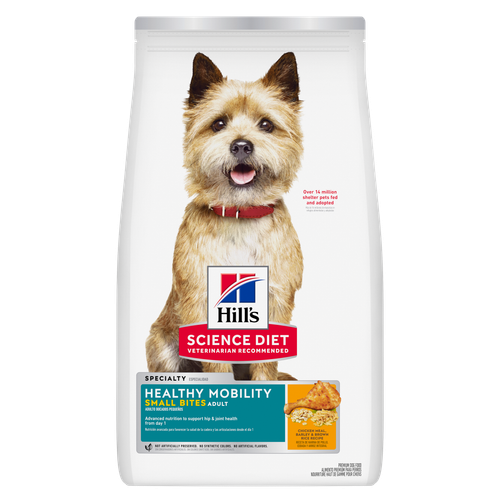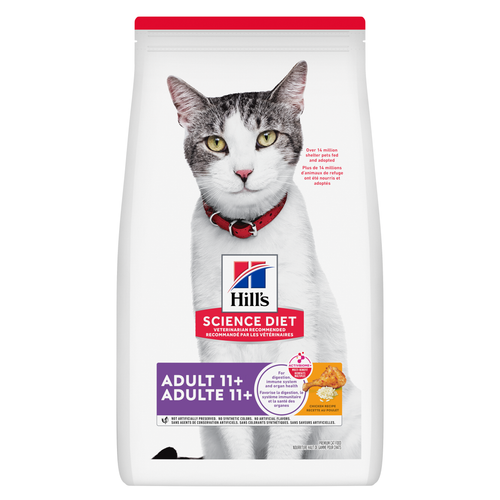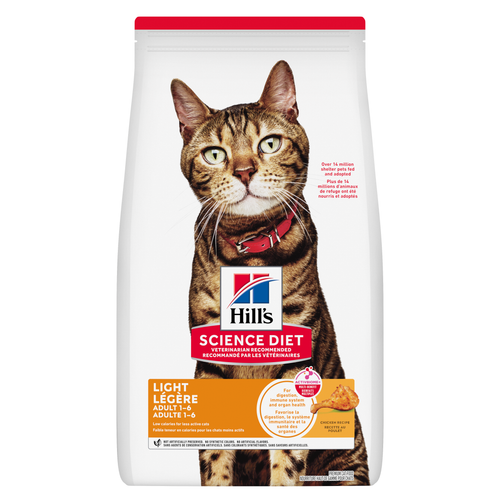
-
Find the right food for your petTake this quiz to see which food may be the best for your furry friend.Find the right food for your petTake this quiz to see which food may be the best for your furry friend.Featured products
 Adult Sensitive Stomach & Skin Small & Mini Chicken Recipe Dog Food
Adult Sensitive Stomach & Skin Small & Mini Chicken Recipe Dog FoodHill's Science Diet Sensitive Stomach & Skin Small & Mini dry dog food is tailored nutrition for Small & Mini dogs while being gentle on stomachs. Nourishes skin & promotes a lustrous coat.
Shop Now Adult Light Large Breed Chicken Meal & Barley Recipe Dog Food
Adult Light Large Breed Chicken Meal & Barley Recipe Dog Food18% lower calories vs. Science Diet Large Breed Adult
Shop Now Adult Healthy Mobility Small Bites Chicken Meal, Barley & Brown Rice Recipe Dog Food
Adult Healthy Mobility Small Bites Chicken Meal, Barley & Brown Rice Recipe Dog FoodAdvanced nutrition to support hip & joint health from day 1
Shop NowFeatured products Adult Healthy Cuisine Seared Tuna & Carrot Medley Cat Food
Adult Healthy Cuisine Seared Tuna & Carrot Medley Cat FoodDelicious seared tuna paired with tender carrots in a mouthwatering sauce
Shop Now Adult 11+ Chicken Recipe Cat Food
Adult 11+ Chicken Recipe Cat FoodSupports brain health & beautiful fur. Helps keep immune system, heart & kidneys healthy.
Shop Now Adult Light Chicken Recipe Cat Food
Adult Light Chicken Recipe Cat Food20% lower calories vs. Hill's Science Diet Adult
Shop Now -
Dog
- Dog Tips & Articles
-
Health Category
- Weight
- Food & Environmental Sensitivities
- Urinary
- Digestive
- Joint
- Kidney
- Dental
- Cancer
-
Life Stage
- Puppy Nutrition
- Adult Nutrition
- Senior Nutrition
Cat- Cat Tips & Articles
-
Health Category
- Weight
- Skin & Food Sensitivities
- Urinary
- Digestive
- Kidney
- Dental
- Stress
- Cancer
-
Life Stage
- Kitten Nutrition
- Adult Nutrition
Featured articles Antioxidants
AntioxidantsUnderstand the importance of antioxidants in your dog or cat's food, and how they can help protect your pet and keep them healthy.
Read More Water
WaterDiscover why water is the most important nutrient for your dog or cat to live a healthy life. Find out how much water your pet should consume each day.
Read More Importance of DHA in your Pet's Food
Importance of DHA in your Pet's FoodLearn about DHA, Docosahexaenoic Acid, a natural omega-3 fatty acid that is essential in the development of the brain and nervous system in cats & dogs.
Read More -


The slight crinkle of a cheese wrapper can send cats flying into the kitchen in search of the salty treat, but can cats eat cheese? Here's the scoop on whether cats and cheese are a good combination.
Cats and Cheese: Is It OK?
Can cats eat cheese? According to experts, yes — but only in moderation. If you give your cat cheese at all, just give them a small piece once in a while, about the size of a dice. For example, you might opt to limit your kitty's cheese intake to times when you need to hide a pill for them.
But, while many cats can tolerate small portions of cheese, if your kitty is lactose intolerant or has a milk allergy, even a small amount of cheese could wreak havoc on their digestive system.
Dairy Intolerance and Dairy Allergy in Cats
Despite the long-standing myth that cats love nothing better than a bowl of milk or cream, most cats can't digest dairy. The Cornell University College of Veterinary Medicine emphasizes that many cats are lactose intolerant and can experience gastrointestinal problems, including inflammation, diarrhea, constipation and vomiting, if they consume dairy.
Cats with a dairy allergy may also react poorly to even a small bite of cheese. (Generally, cats don't have a lot of food allergies, but dairy, as well as fish and red meat, are the more common ones.) Like kitties with lactose intolerance, if your cat has a dairy allergy, eating cheese could lead to digestive issues and might even affect their immune system.
Common signs your cat has a dairy allergy include the following after consuming lactose products:
- Vomiting
- Diarrhea
- Gas
- Itchy and/or red skin patches
- Hair loss
If your cat shows these or any other unusual signs, contact their veterinarian as soon as possible to schedule a check-up.
When Cheese Is a No-No
According to the Cummings Veterinary Medical Center at Tufts University, you should avoid giving your cat cheese if they need to lower their salt intake and/or if they have a heart condition. In addition to cheese, if your kitty is on a low-sodium meal plan they should absolutely stay away from deli meat, fast food, potato chips and bread.


Tasty Tips
Focus on Calories

No more than 8 to 10 percent of a pet's daily calorie allotment should come from treats or food that wasn't recommended by a veterinarian. Cheese, for example, is a popular human food that can be way too high in calories. In fact, giving a 1-ounce cube of cheddar cheese to a 10-pound cat is equal to a person scarfing two and a half cheeseburgers, all at once.
The best approach for cat parents? Avoid the extra snacks and substitute extra love instead.
Types of Cheese: Good vs. The Bad
If you do sneak your cat a cheesy treat, certain varieties may be better than others:
- Cheddar: One of the most popular cheeses around, cheddar is a semi-hard cheese that doesn't contain much lactose. This doesn't mean, however, that your cat should eat large amounts of cheddar, as it can cause tummy troubles.
- Swiss: A favorite among sandwich lovers, Swiss cheese is considered a healthy cheese for humans because it's high in protein and low in sodium and fat. Like cheddar, it has low amounts of lactose, but it can still lead to digestive issues.
- Mozzarella: Plenty of pet parents have caught their feline friends sneaking into the pizza box, but is all that gooey cheese good for your cat? Not so much. Soft cheeses like mozzarella, whether raw or cooked, are health hazards for cats because they are high in lactose. Cottage cheese and cream cheese pose similar risks and should be avoided.
- Brie: A popular soft cheese, brie is made with raw milk, which may contain Salmonella and Listeria, pathogens that cause serious illness. Other raw soft cheeses to avoid are blue cheese and Camembert.
- Blue cheese: Know what makes cheese blue? Mold. This type of cheese, including Stilton, is made with cultures of the mold Penicillium, which can be toxic to pets. For this reason, don't feed your cat moldy cheeses.
Say Cheese
Feeding your cat a bit of cheese here and there shouldn't be a problem, but speak to your cat's vet about whether or not it's a healthy option for your kitty. If you do feed your cat cheese, only give it to them once in a while and in small amounts. That'll give them something to smile about!


Christine O'Brien is a writer, mom, and long-time cat parent whose two Russian Blues rule the house. Her work also appears in Care.com, What to Expect, and Fit Pregnancy, where she writes about pets, pregnancy, and family life. Find and follow her on Instagram and Twitter @brovelliobrien.
Related products

20% lower calories vs. Hill's Science Diet Adult

With delicious chunks in a decadent gravy

Supports brain health & beautiful fur. Helps keep immune system, heart & kidneys healthy.

Delicious seared tuna paired with tender carrots in a mouthwatering sauce
Related articles

When you adopt a cat, you don't just gain a best friend; you also save her life. Here's why getting a cat from a local animal shelter makes so much sense.

Discover the benefits of Hill's line of kitten foods and how they provide complete and balance nutrition for growing kittens.

Cats are naturally very clean and chances are your kitten will already have learned how to use the litter box from her mother before she comes to live with you.

Discover how to train your cat, starting with very basic first steps that both reward good behavior and discourage the bad.

Put your cat on a diet without them knowing
Our low calorie formula helps you control your cat's weight. It's packed with high-quality protein for building lean muscles, and made with purposeful ingredients for a flavorful, nutritious meal. Clinically proven antioxidants, Vitamin C+E, help promote a healthy immune system.
Put your cat on a diet without them knowing
Our low calorie formula helps you control your cat's weight. It's packed with high-quality protein for building lean muscles, and made with purposeful ingredients for a flavorful, nutritious meal. Clinically proven antioxidants, Vitamin C+E, help promote a healthy immune system.

